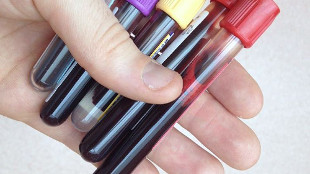Three studies presented at the Alzheimer’s Association International Conference this week describe the performance of blood tests used to diagnose, and even predict, Alzheimer’s disease using circulating levels of a form of tau protein called p-tau217. The largest assessment of this approach, which included 1,402 participants, showed that circulating p-tau217 levels worked just as well at detecting Alzheimer’s as standard PET scans and tests of cerebrospinal fluid.
“This blood test very, very accurately predicts who’s got Alzheimer’s disease in their brain, including people who seem to be normal,” Michael Weiner, an Alzheimer’s disease researcher at the University of California, San Francisco, who was not involved in the study, tells The New York Times. “It’s not a cure, it’s not a treatment, but you can’t treat the disease without being able to diagnose it. And accurate, low-cost diagnosis is really exciting, so it’s a breakthrough.”
A blood test could help identify people on track to develop Alzheimer’s early on—and perhaps get them enrolled in drug trials aimed at finding an effective treatment for the disease. Scientists have pursued a number of potential circulating biomarkers, such as amyloid-β, to find those that can reliably diagnose Alzheimer’s disease or predict its development, but to date none have come to market.
See “The Hunt for a Blood Test for Alzheimer’s Disease”
High levels of tau or its phosphorylated form, p-tau, have emerged as promising biomarker candidates because they may indicate the presence of damaging structures known as neurofibrillary tangles in the brain.
The large study on one type of p-tau, p-tau217, published in JAMA July 28 to coincide with the presentation at the meeting, was a collection of three experiments using a blood test developed by Eli Lilly (some of the coauthors work for the company). In one assessment of several hundred Swedes, the test accurately distinguished patients who had Alzheimer’s from those with other forms of dementia with 89–98 percent accuracy. “That’s pretty good. We’ve never seen that” precision before, Maria Carrillo, the Alzheimer’s Association’s chief science officer, tells the Associated Press.
In another assessment of the Eli Lilly test, which included hundreds of related individuals, some of whom have a gene that causes Alzheimer’s, p-tau217 levels in the blood aligned with the genetics, even decades before cognitive impairment is likely to begin.
Another study presented at the conference found a p-tau217 blood test could accurately distinguish Alzheimer’s patients from those with frontotemporal lobar degeneration, according to a conference press release. And a third presentation of a study by Suzanne Schindler of Washington University in St. Louis and her colleagues reported that circulating p-tau217 was superior to another form that’s been studied as a potential biomarker, p-tau181, as a proxy for amyloid accumulation in the brain.
“I personally find it very reassuring that these different groups are using different types of assays and getting the same result,” Schindler tells the Times. “It looks real. It looks like 217 has tremendous promise as a blood test for Alzheimer’s disease, and it is likely to correspond with the symptoms.”
Speaking to The Guardian, Clive Ballard, who studies age-related disease at the University of Exeter Medical School and who was not involved in these projects, says, “further validation in people from more routine clinical settings are still needed, and a lot of work will be needed to achieve standardisation of the test across laboratories—so it could still be at least five years before we see an accurate blood biomarker test for dementia in the clinic.”







